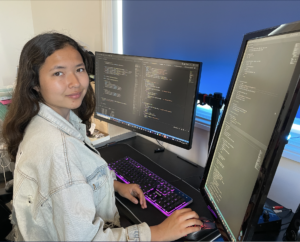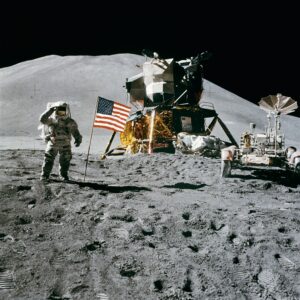
Meet Angelina Tsuboi, an exceptional intern at NASA, who vividly recounts her remarkable journey into the realm of software development.
When it comes to huge opportunities and technological innovations, NASA stems from its pioneering efforts in space exploration, and scientific research, making it a globally recognized institution at the forefront of human exploration and understanding of the universe.
Her enthrallment with this field commenced at the tender age of 7 when she took part in an introductory programming class at her school.
Furthermore, after a fluency in 18 programming languages and starting as an independent contractor at just 13 years old, Angelina has developed a diverse skill set.
Her recent focus has been in the cybersecurity field, specifically creating aerospace cybersecurity tools for satellites, avionics, and drones.
Recognizing the vulnerability of outdated aerospace systems to cyber attacks, she took immediate action, utilizing her expertise to build projects aimed at enhancing the defence of aerospace systems.
Instantly captivated, made a resolute decision to pursue her passion, embarking on a multitude of projects encompassing web applications, mobile apps, and diverse programs, which didn’t stop just here.
“When I encounter a prominent problem in the world that seems to lack sufficient attention, I take it upon myself to lead engineering initiatives aimed at solving the issue”
Her main drive at work
“The main intention behind all of my work is to be in service of humanity”
Amidst a world burdened with various challenges, Angelina’s driving force lies in the application of human ingenuity to solve problems and extend aid to others.
Her role at NASA and her contribution to the mission of the organization
Angelina, currently engaged in impactful endeavours at the aeronautics and space administration organization, delves into the realm of scientific exploration by conducting meticulous research on meteorites.
Her primary objective revolves around investigating the origins of Earth’s volatile chemicals, which is a critical aspect of understanding our planet’s composition.
This dedicated pursuit allows her to contribute to NASA’s broader understanding of the formation and historical evolution of the solar system.
In tandem with her scientific research, her work extends to the vital domain of aerospace cybersecurity.
Through a diverse array of projects, she focuses on enhancing security measures for various aerospace applications, including aircraft radar systems and satellites, directly contributing to the development of resilient systems that safeguard payloads during space missions, ensuring their safe and successful transportation.
Challenges during the internship
“The beginning of the internship was a lot like drinking water out of a fire hose”
Angelina reflects on her extraordinary internship experience at NASA, where she and her fellow interns are entrusted with groundbreaking research.
Her tasks reflect swiftly on comprehending the complexities of meteorites, enabling them to engage in advanced technical research under the prestigious NASA flag.
One of Angelina’s remarkable achievements includes the development of a cutting-edge device designed to protect aircraft radar systems, specifically the Automatic Dependent Surveillance-Broadcast (ADS-B).
This ingenious device acts as a vigilant guardian, actively monitoring for any signs of malicious signal transmissions initiated by ground-based hackers.
By detecting and thwarting potential threats, the device plays a pivotal role in enhancing the security and integrity of aircraft radar systems.
Another remarkable project Angelina embarked upon involved the creation of a satellite reconnaissance tool, this powerful tool empowers researchers to obtain real-time information regarding the satellites orbiting our planet.
By providing valuable insights and data, the tool assists in advancing scientific research and furthering our understanding of space.
Additionally, Angelina has delved into the realm of drone-related cybersecurity with the development of a drone digital forensics platform which aids investigators in conducting thorough inspections and analyses of drone-related crimes.
By leveraging digital forensic techniques and advanced capabilities, the platform enables investigators to gather crucial evidence, contributing to the pursuit of justice in cases involving drones.
Through her multifaceted projects, she demonstrates her commitment to fortifying critical systems and empowering researchers and investigators with the tools needed to address emerging challenges in the ever-evolving landscape of cybersecurity.
Her skills and experiences as a pilot helped her in achieving the goal of
becoming an analog astronaut
“Learning how to fly planes was an entirely different feeling for me and exposed me to a completely different paradigm for viewing the world”
Through her aviation journey, she has encountered the challenges inherent in handling complex systems, developing a heightened situational awareness, and making rapid decisions in dynamic environments.
These skills and traits, honed through aviation, hold immense value for her ultimate goal of becoming an analog astronaut.
The multifaceted demands of flying an aircraft, requiring adaptability, swift decision-making, and mastery of complex systems, serve as a solid foundation for the challenges she may face as an analog astronaut.
Her most important skill developed at NASA
In discussing her work for NASA, she highlights a key skill she has been actively developing: the ability to conduct research in a team setting and effectively communicate the findings to fellow scientists and researchers.
Within the NASA research landscape, collaboration is paramount, and the collective effort of teams plays a crucial role in advancing knowledge and understanding.
This encompasses not only gathering and analyzing data but also effectively communicating the acquired knowledge to her peers, fostering an environment of shared understanding and continual learning.
Her fascination for NASA
“I really admire NASA’s commitment towards getting humanity to the stars and understanding the
intricacies of the universe”
Gazing at the vast expanse above, Angelina’s admiration for NASA comes from its resolute dedication to comprehending the intricacies of space and the great space missions.
She acknowledges the magnitude of the effort invested by the organization, driven by an insatiable curiosity to delve deeper into the cosmos and uncover the secrets that lie beyond that.
Science and Research Projects at UCLA
“During my research experience at UCLA,
I learned that most research
projects are iterative and cyclic”
One crucial lesson she learned was the iterative and cyclic nature of most research projects, throughout the research phase, she and her team continuously circled back to the project’s objectives and applications, utilizing them as a guiding framework for refining and enhancing the system they were creating.
Through each cycle of refinement, Angelina alongside her team gained invaluable insights into the intricacies and nuances of the product being developed, enabling them to make informed decisions and optimize its performance.
Role Models who have influenced her work

Besides her work, she enthusiastically finds great inspiration in the work of Margaret Hamilton, a pioneering computer scientist who developed onboard flight software for NASA’s Apollo program.
Admiring Hamilton’s tenacity and groundbreaking contributions during the early stages of computer technology, she recognizes the compulsory role her work played in the success of the Apollo mission and the advancement of computer systems onboard spacecraft.
NASA’s views on Angelina’s work
“I was able to get a position at NASA after applying for a research position on their website”
At NASA, individuals possess a deep understanding of the importance of their research topics, therefore her acceptance into their program is a pivotal moment in her academic journey, allowing her to join a team of talented researchers and contribute to the expanding understanding of our vast universe.
“The fear of getting started is in my opinion the number one reason
many people are taken aback by the fields of science and technology”
When it comes to a career in this field, she humbly recommends overcoming the feeling of overwhelm by starting with accessible and manageable topics or project ideas, which in her case are referred to as software development projects.
She highlights the significance of maintaining a hopeful perspective for the future, as it serves as a powerful motivator for progress and development.
“Inventions and innovations that serve humanity become meaningful vehicles for bringing about positive change”
With these recommendations, Angelina encourages aspiring scientists to dive into their pursuits fearlessly and embrace the transformative power of their ideas.
By starting small, being attentive to the world around them, and nurturing a hopeful mindset, they can contribute to a brighter future and bring about benevolent change.
Carina Schuster is a multilingual tech and science editor for The London Financial & a podcast anchor and producer for SciTech Suisse, covering groundbreaking stories in the matter of disruptive technology developments and interviewing top experts in AI, the Metaverse, Web3, Blockchain and scientific research. Throughout her experience as a journalist in the editorial and digital worlds, she was selected by CNN Money Switzerland in 2020 as a digital producer intern and has demonstrated a collaborative and creative spirit, working alongside talented journalists and delivering impactful stories with the main aim of simplifying the complexity of technology.
